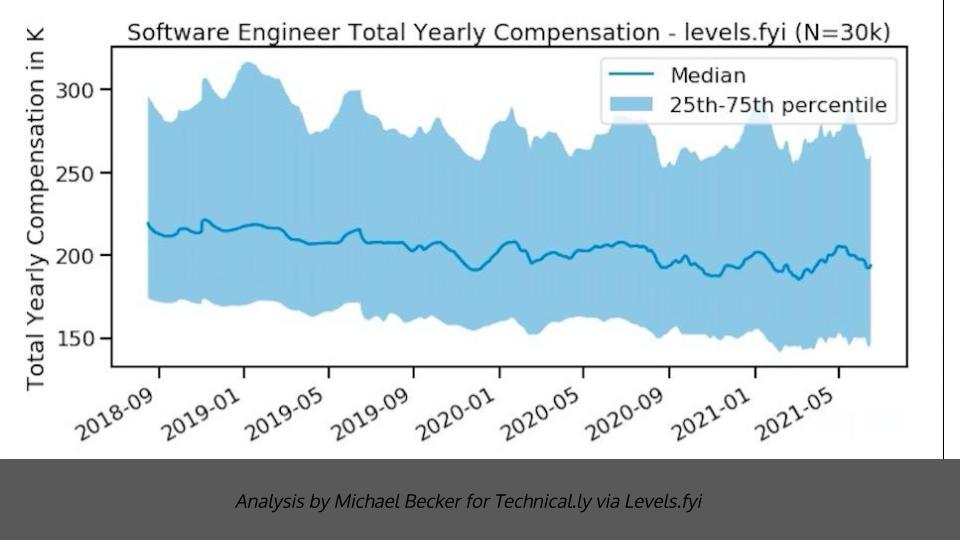Written by Technically Media CEO Chris Wink, Technical.ly’s new Culture Builder newsletter features tips on growing powerful teams and dynamic workplaces. Below is the latest edition we published. Sign up here to get the next one this Friday.
A nervous startup founder once confided in me that he just signed a compensation package for a software developer that was twice as rich as his own. The narrative of the pricey tech team is now in the popular imagination. Recent data show that narrative may be outdated.
To many, growth in tech salaries, especially among coveted engineers, has appeared to be nothing short of unrelenting for the last 20 years. For one, salaries have proven fairly recession proof since the 1990s. As software eats the world, the supply of experienced engineers hasn’t kept apace.
In more recent years, though, tech worker salary growth has been uneven. This follows Harvard Business School research published last fall that showed just five U.S. metro areas experienced “exceptional” tech worker wage growth: New York City, Silicon Valley, San Francisco, Seattle and Washington, D.C. No other cities compared – not Austin, Boston, Chicago or any other city. Elsewhere, software salary growth has been cooling in recent years. Another way of saying that: expensive cities with competitive labor markets bid up tech wages.
In the last year nationwide, average tech salaries grew a steady, if manageable, 3.6%. The importance of software skills have already been priced into salaries nationwide.
You might be thinking: OK, but that data isn’t real-time enough to confront the remarkable disruption taking place right now. I know I’ve heard of extraordinary salary spikes from a dozen CEOs and HR pros in recent weeks. Economists are having a spirited debate whether the inflation that post-pandemic pent-up demand is causing will be sustained or transitory. No signs yet of meaningful wage inflation, but could tech workers be an exception?
It doesn’t seem so — at least not yet – according to the latest data analyzed for Technical.ly from Levels.fyi, a salary transparency service. The analysis of engineer salaries in the U.S. Northeast provided to Technical.ly shows very little variation over the last year, despite such widespread disruption.

The analysis comes from Michael Becker, a data scientist who founded meetup group DataPhilly. Though the underlying data is somewhat limited — just 50,000 across the U.S. – it is nearly as recent as it gets. Rather than growth, this data actually show a downward trend, though Becker cautions that could be the result of a sampling bias.
“For example, perhaps the types of people who use their site has changed over time, resulting in the downward trend,” he wrote in an email. Still, rather than surging growth, the inflation-adjusted data concur with that research showing a general salary cooling since 2018.
How does this square with people with different experiences?
A few explanations come to mind. One is that tech worker wage pressure is still at the beginning of a precipitous rise. Alternatively, another is that extraordinary salary changes are just yet another exceptional consequence of an exceptional time. One more is that higher-paying, remote-flexible companies are picking off below-market salaries. Tell me: what do you think? Reply here or to chris@technical.ly and let me know what you’re seeing.
I spoke the other week to an internal recruiter at a well-known company based in Manhattan who is turning his focus to lower-cost cities. He’d like to hire that startup founder and his developer, too.
And now the links.
Sign up for the Culture Builder newsletterWhat else we’re reading
- 4 Types of Workplace Cultures
- At Fortune 500 companies, women account for a third of workers, firm says
- Gartner Says HR Leaders Must Establish Consequential Accountability to Achieve Diverse Leadership Benches. One key takeaway from Gartner’s report is that diversity work shouldn’t stop because diverse candidates have been hired.
- 57% of workers believe employees should still be required to wear a mask when working on site, even after receiving the COVID-19 vaccination
- To win the war for talent, you have to flex. Job candidates now want a workplace that reflects the cultural norms they have come to know.
Company culture stories we’ve published lately
- Breast pumping is something employees need to do during work. Here’s how companies can support them
- What do you do when a job candidate ghosts you?
- This Philly founder is opening a coworking space amid a surge in remote work. Here’s why
- Goodbye office: Why a Baltimore agency is emerging from the pandemic with a hybrid work model
- Hear firsthand about the culture at these 5 hiring tech companies







